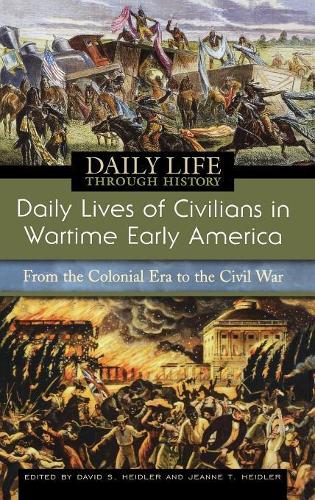
Daily Lives of Civilians in Wartime Early America: From the Colonial Era to the Civil War
(Hardback)
Publishing Details
Daily Lives of Civilians in Wartime Early America: From the Colonial Era to the Civil War
By (Author) David S. Heidler
Edited by Jeanne T. Heidler
Bloomsbury Publishing PLC
Greenwood Press
30th January 2007
United States
Classifications
Tertiary Education
Non Fiction
Social and cultural history
Civil wars
Early modern warfare (including gunpowder warfare)
973.5
Physical Properties
Hardback
280
Description
While soldiers were off fighting on the fields of war, civilians on the home front fought their own daily struggles, sometimes removed from the violence but often enough from deep within the maelstrom of conflict. Chapters provide readers with an excellent, detailed description of how women, children, slaves, and Native Americans coped with privation and looming threat, and how they often used, or tried to use, periods of turmoil to their own advantage. While it is the soldiers who are often remembered for their strength, honor, and courage, it is the civilians who keep life going during wartime. This volume presents the lives of these brave citizens during the early colonial era, the American Revolution, the War of 1812, the Mexican War, and the Civil War. This volume begins with Armstrong Starkey's detailed description of wartime life during the American Colonial era, beginning with the Jamestown, VA settlement of 1607. Among his discussions of civilian lives during the Pequot War, King Philip's War, and the Seven Years' War, Starkey also examines Native American attitudes regarding war, Puritan lives, and Salem witchcraft and its connection to war. Wayne E. Lee continues with his chapter on the American Revolution, investigating how difficult it was for civilians to choose sides, including a telling look at soldier recruitment strategies. He also surveys how inflation and shortages adversely affected civilians, in addition to disease, women's roles, slaves, and Native Americans as civilians. Richard V. Barbuto discusses the War of 1812, taking a close look at life on the ever-expanding frontier, rural homes and families, and jobs and education in city life. Gregory S. Hospodor observes American life during the Mexican War, examining how that conflict amplified domestic tensions caused by sharply divided but closely-held beliefs about national expansion and slavery. Continuing, James Marten looks at southern life in the South during the Civil War, examining the constant burden of supporting Confederate armies or coping with invading northern ones. Paul A. Cimbala concludes this volume with a look at northerner's lives during the Civil War, offering an outstanding essay on a home front mobilized for a titanic struggle, and how the war, no matter how remote, became omnipresent in daily life.
Reviews
In this series scholars write essays that reveal both the universal civilian experience in wartime and aspects of it that made it unique by time and place. The essays in this volume demonstrate the variety of the American experience in the two centuries after colonization as well as the constant blurring of the lines between civilians and combatants. The contributions cover wartime colonial America, the Revolution, the War of 1812, the Mexican War, and the experiences of civilians in both the north and south during the Civil War. * Reference & Research Book News *
Author Bio
David S. Heidler is an award-winning historian on the faculty of Colorado State University, Pueblo. He is co-author with Jeanne T. Heidler of Encyclopedia of the American Civil War: A Political, Social, and Military History. Dr. Heidler is also co-editor with Jeanne T. Heidler of the series Daily Lives of Civilians during Wartime and American Soldiers' Lives. Jeanne T. Heidler is Professor of History at the United States Air Force Academy, and an award-winning author. Along with David S. Heidler she is the co-author of Encyclopedia of the American Civil War: A Political, Social, and Military History. Dr. Heidler is also co-editor with David S. Heidler of the series Daily Lives of Civilians during Wartime and American Soldiers' Lives.
